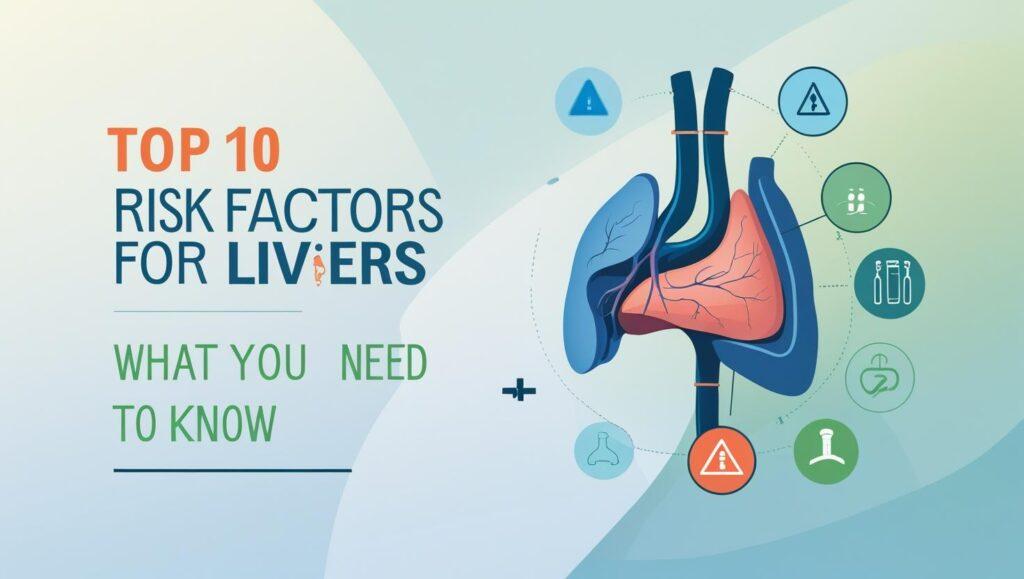Top 10 Risk Factors for Fatty Liver Disease: What You Need to Know

Why It’s Essential to Understand the Risk Factors for Fatty Liver Disease
We live in a time where the pace of life is fast, our routines are busy, and our bodies often bear the silent consequences of lifestyle choices we don’t always notice until they catch up to us. One such silent health concern that is quietly affecting millions across the globe is fatty liver disease — and understanding the risk factors for fatty liver disease has never been more important.
The liver is one of the most vital and forgiving organs in the body. It works tirelessly filtering toxins, processing nutrients, and supporting your immune system. But even this resilient organ has its limits. When overwhelmed, it begins to accumulate fat, slowly and silently, giving rise to a condition known as fatty liver disease.
Understanding the risk factors for fatty liver isn’t just a medical exercise—it’s an act of self-awareness and self-care. It’s about creating a more intentional relationship with your health.
A Quiet Condition with Loud Consequences
Fatty liver disease, especially Metabolic dysfunction- associated steatotic liver disease , often arrives without symptoms. There’s no pain, no visible signs, just a gradual build-up of fat in the liver cells. Over time, this can lead to inflammation, scarring (fibrosis), and even irreversible liver damage like cirrhosis.
But here’s the hopeful part: knowing the risk factors for fatty liver gives you the power to take control before damage is done. Like many chronic conditions, early awareness can completely change the trajectory of your health.
Listening to the Body: Top 10 Risk Factors for Fatty
Just as we learn to listen to our emotions or regulate our breath, we can also, in the same way, learn to listen to the signs our bodies give us. Below, you’ll find ten key factors that can increase your risk for developing fatty liver disease:
1. Overweight
Carrying more weight than your body comfortably supports, especially around the abdomen—is one of the strongest predictors of fatty liver. This visceral fat acts almost like an internal stressor on your organs, especially the liver.
Reflection: What weight—both physical and emotional am I carrying that no longer serves me?
2. High blood sugar levels/ diabetes
When the body becomes resistant to insulin, blood sugar levels rise. The liver, trying to help, begins storing fat as a buffer. Over time, this natural compensation becomes harmful.
In fact, gentle movement, mindful eating, and balanced living can significantly improve insulin sensitivity.
3. Elevated Cholesterol and Triglycerides
Our modern diet often includes hidden fats and sugars that disrupt the delicate balance of cholesterol and triglycerides. These fats, when circulating in excess, eventually get stored in the liver.
Ask Yourself: Am I nourishing my body or simply feeding a craving?
4. Highly Processed Diets
A diet full of sugary drinks, white bread, processed snacks, and fast food creates an internal environment that encourages fat accumulation in the liver. Overconsumption of fructose, in particular, is known to accelerate this process. Examples of high fructose fruits: apples, pears, grapes, mangoes, and watermelon
By reconnecting with natural, whole foods, you support your liver’s healing — and in return, your liver will thank you.
5. Lack of Movement
Physical stagnation often mirrors mental stagnation. Just as our emotions need flow and release, so does the energy in our body. When we are sedentary, our metabolism slows and the risk of fatty liver increases.
As a gentle reminder, just 20–30 minutes of daily walking can gradually ignite long-lasting health benefits over time.
6. Alcohol Consumption
Even modest alcohol use can place added strain on the liver, particularly when combined with other risk factors. While alcohol may serve as an emotional escape for some, the body, nevertheless, always remembers. Instead, try to find comfort in presence — not in a bottle.
7. Metabolic Syndrome
This cluster of conditions—abdominal fat, high blood pressure, high blood sugar, and abnormal cholesterol—is like a warning signal from the body. Each component multiplies the risk of fatty liver.
Healing starts with recognizing the signals before they turn into symptoms.
8. Hormonal Imbalances (like PCOS)
Conditions such as polycystic ovary syndrome (PCOS) disrupt hormonal balance, making insulin resistance and fatty liver more likely in women—even those with normal body weight.
Balance in life often starts with balance within.
9. Sleep Apnea and Poor Sleep Quality
Sleep is when the body restores, detoxifies, and heals. Chronic sleep disorders like obstructive sleep apnea reduce oxygen to the liver, causing oxidative stress and worsening inflammation.
Create a bedtime ritual. Let your sleep be sacred.
10. Genetics and Certain Medications
Once you’ve identified the risk factors for fatty liver that resonate with your lifestyle or family history, the next step isn’t guilt—it’s empowerment.
While we may not be able to choose our genes, we can still choose how we respond to them.
From Risk to Action: Fatty Liver Disease
Once you’ve identified the risk factors for fatty liver that align with your lifestyle or family history, the natural next step isn’t guilt — rather, it’s a chance for empowerment.
Small changes add up:
- Cook your meals with intention and mindfulness.
- Move your body in ways that bring you joy.
- Limit what causes inflammation be it sugar, alcohol, or stress.
- Check in with your healthcare provider as an act of respect to your body.
Reconnecting With Your Liver’s Purpose
The liver is more than just an organ. It’s a reminder of your body’s incredible capacity to heal, process, and protect. It absorbs the weight of what you consume physically, emotionally, and energetically.
Understanding the risk factors for fatty liver is about more than preventing disease. It’s about listening to your body’s needs, honoring your internal ecosystem, and choosing daily habits that support long-term vitality.
Final Thought
Just as we learn to regulate our emotions or nervous system through awareness and intentional action, we can regulate our physical health the same way. Fatty liver disease doesn’t develop overnight and it doesn’t have to define your future.
Your liver has been showing up for you every day. Today, maybe you start showing up for it.
